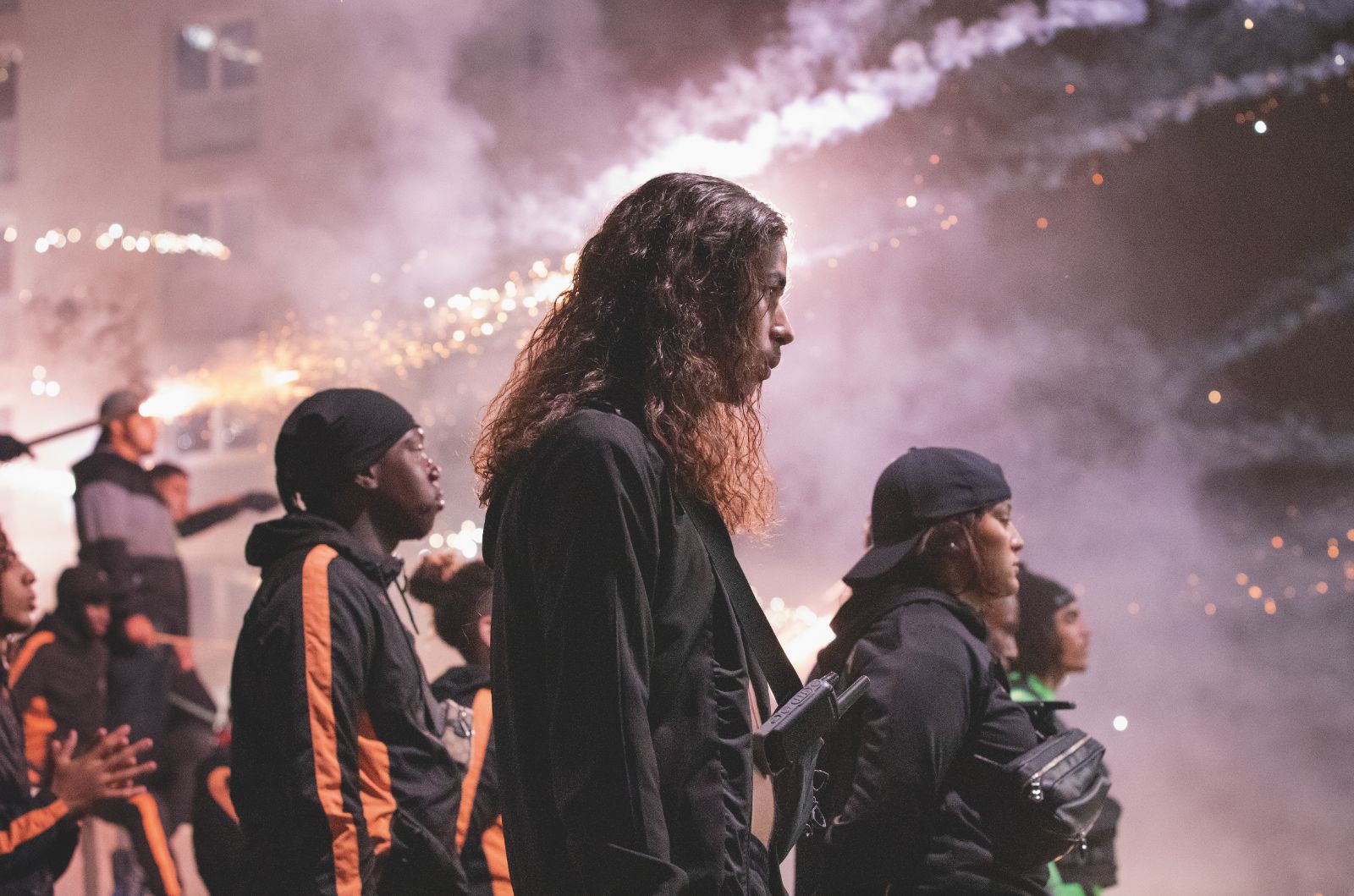Is reinvention overrated? For at least 45 minutes, Athena (named for the fictional area where the film is based as well as the goddess of wisdom and war) threatens to be Romain Gavras’ magnum opus, but the building blocks haven’t changed. Look at his earliest music video, released in 2002: high rises, young men, tracksuits, BMX tricks. Then look at his work on Justice’s Stress, released seven years after: high rises, young men, tracksuits, only this time with Molotov cocktails and a strain of nihilistic chaos. Even as his most acclaimed work (Bad Girls, Gosh, No Church in the Wild, his early features) took him to bigger budgets and distant places, Gavras has never strayed far from his core ideas; his career has been an ode to finessing and amping up.
Just wait for the opening sequence, where Gavras, in a single take, moves a tornado of action all the way from a police station to an apartment block that has taken on the look of a fortress. The catalyst is a familial and familiar tragedy: a viral video of a young man being killed by police officers. In the station, his brother emerges from the crowd with a Molotov and all hell breaks loose: there is a riot, a stolen safe, a getaway in a cop van with hoards of extras racing alongside, a billowing French flag, more young men, more tracksuits, more wheelies, more scramblers. “Back to the hood!” is the call. The frame is packed, the mood breathless—if the long take has passed its heyday, reports of its death have been exaggerated.
Gavras’ film is also a happy example of budget being put to good use. Athena played in competition this week at a Venice that has so far boasted two Netflix-financed passion projects that have spent big, and to wildly varying degrees of success. Gavras has troubled the streaming giant’s deep pockets to the tune of $15 million, a war chest that lets him turn entire buildings in Évry-Courcouronnes into Boschian nightmares, and to hire many of the inhabitants (he claims 90% appeared as extras, comparing the set-up to Dogville). With them his film holds two aces: an unmistakable sense of place and of real indignation.
In terms of narrative (one eventually appears), Gavras positions Athena as a Greek tragedy. Its central story revolves around the victim’s brothers—two from the same dad, one not. The youngest, Karim (newcomer Sami Slimane), is the revenge-hungry commander of this civil uprising; the elder, Abdel (Dali Benssalah of No Time To Die), a military man called back from the front to attend the funeral, is determined to extinguish it. Glimpses of background TV screens suggest the events in Athena have reverberated in the wider world, with France descending into civil war. A conspiracy theory does the rounds that a far-right group is responsible, looking to fan the flames of racial tensions. “They want this mayhem,” Abdel reminds his younger brother.
The film is excellent up to the point when these allusions to the classics end. Gavras recently name-checked Delacroix as a visual reference point but his film is awash with nods to war films: riot police ascend buildings like the orc army in Helm’s deep; there’s the dazed boy of Come and See, transformed here into a green-around-the-gills police officer; and there’s the recreation of the battle of Carthage from Gladiator, the chariots reimagined as scramblers and filmed under a torrent of roman candles. There are inevitable echoes of Children of Men and Son of Saul, but the busy energies of Gavras’ film owe more to John Carpenter (the font used for the opening credits seems a direct homage) and Romeo + Juliet (though few women speak in Athena, let alone much else.)
Gavras mashes it all together into a pulsating film that gestures toward real injustices. Would a full 90 minutes of this have been healthy? We’ll never know, but I would trade the entire last half-hour for another minute in the mixer. The script was co-written with Ladj Ly, director of 2019’s Les Miserables, a film that took the ingredients of Gavras’ cinema and added a layer of political urgency. The two filmmakers are cut from the same cloth but you sense a clash of sensibilities, and Athena begins to sag under the weight of its own allegory. Gavras, for better and worse, is a creature of spectacle; not apolitical, per se, but more concerned with triggers and semiotics than manifestos.
Breathless invention gives way to predictable plot, and one that bangs the same drum as Les Miserables—and in less subtle ways. The basic setup here seems drawn from that film’s epilogue, but for a dazzling moment Gavras strips it to the bones, pure sound and fury. High rises, riot police, wheelies—same as it ever was.
Athena premiered at the Venice Film Festival and arrives on Netflix on September 23.

